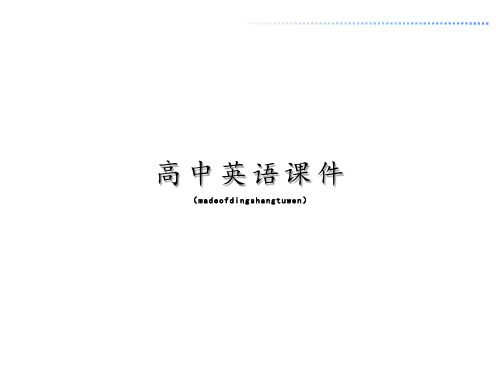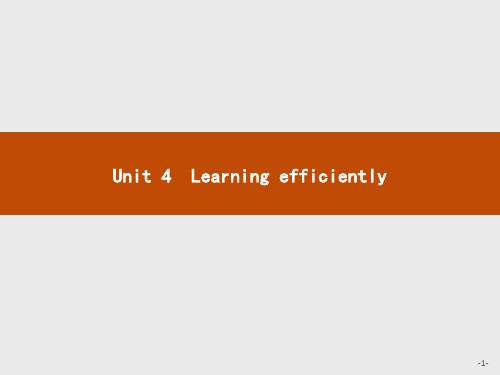人教版高中英语选修十 Unit 4 Learning efficiently-语法篇(学生版)
人教版高中英语选修十《Unit4Learningefficiently》SectionⅣ

what to do now. 要是那时你听我劝告的话,你现在就知道该做 什么了。
4.含蓄条件句
用一个介词短语或分词短语来代替条件句,这 就是含蓄条件句。这些词有:without,but for, or,otherwise,with,but,even,in case of 等。 Given more attention,the trees could have
她坚持要预订座位。 Hedemandedthathe(should)betoldeverything. 他要求将一切告诉他。
【温馨提示】 suggest作“暗示,表明”和 insist作“坚持说,坚持认为”解时,从句要用 陈述语气。 Heinsistedthathewasnotinvolvedinthecase. 他坚持认为自己与那个案子没有牵连。
5. He hesitated for a moment before kicking
Their desire was that a treaty should be signed at once. 他们的愿望是马上签订协约。
4.If only 后面需要用虚拟语气,句子多用一般
过去时或过去完成时。
If only I could operate the computer. 要是我会操作电脑该多好。
It is suggested that the old man should be sent to hospital immediately. 有人建议立即把老人送往医院。
3.用在表语从句和同位语从句中
人教版高中英语选修10 Unit 4《Learning efficiently》

K课前学习
EQIAN XUEXI
K课堂深入
ETANG SHENRU
四、阅读课文 HOW TO BECOME A SUCCESSFUL READER,回答 下列问题
1.The key to success in reading is . A.choosing the texts at the right level for practise B.frequent practise plus right techniques C.improving your reading skills D.adopting the techniques that good readers use 2.A text with more than 5% new words . A.is not fit for you to read B.is not interesting,so you can’t read it C.is found on the Internet D.is boring 3.Pre-reading activities help you a lot EXCEPT A.recalling your knowledge about the subject B.teaching you new words found in the text C.giving you the topic of the text D.grasping the way the text is organized
2.look up
3.放慢
4.in detail
5.as ng Up,Pre-reading,Reading & Comprehending
一 二 三 四
人教版高中英语选修10 Unit 4 Learning effectively Writing课件PPT

5.以中国传统文化为特色 6.在...方面给某人建议 7.充分利用社交媒体
8.积极参与 9.采取一些有效的方法 10.提高学习效率
人 教 版 高 中 英语选 修10 U n it 4 L e arni ng e ff ective ly W ri ting课 件(共2 2张PPT )
人 教 版 高 中 英语选 修10 U n it 4 L e arni ng e ff ective ly W ri ting课 件(共2 2张PPT )
Underline sentences from Template A&B.
Beginning 1.我知道你在学习中文方面有困难,因此我想 给你提供如下一些建议。 2.我很高兴得知你正在安排一个以中国传统文 化为特色的音乐周活动。因此我想给你提一些 I建ho议pe。that my advice will be beneficial to you
Ending Ending Express ____h_o_p__e_________(表达愿望)
人 教 版 高 中 英语选 修10 U n it 4 L e arni ng e ff ective ly W ri ting课 件(共2 2张PPT )
人 教 版 高 中 英语选 修10 U n it 4 L e arni ng e ff ective ly W ri ting课 件(共2 2张PPT )
success.
人 教 版 高 中 英语选 修10 U n it 4 L e arni ng e ff ective ly W ri ting课 件(共2 2张PPT )
人 教 版 高 中 英语选 修10 U n it 4 L e arni ng e ff ective ly W ri ting课 件(共2 2张PPT )
高中英语人教版选修10课件:+Unit+4Learning+efficiently-Reading

The writing characteristics of the passage
The topic is introduced directly by asking a question “how to become a successful reader”. This is the question the answer to which the students are eager to know. This arouses the interest of readers and leads them into the article. Then the writer shows three strategies for becoming a good reader.
Warming-up
What does the graph tell you about the studk Guo Qiang is spending an appropriate amount of time on each aspect of his English study? Do you think a survey of your classmates would show similar results?
Sum up the main idea of the text The text provides the readers strategies for becoming a good reader and the techniques of good readers. From the text we know if we want to be a good reader, we must do a lot of practice, make our reading practice enjoyable and learn the techniques of good readers.
高中英语 Unit 4 Learning efficientlyUsing Language

Unit 4
Using Language
A Survey of your learning styles
1. When you have a list of new words to learn for English, how do you do about learning them?
Visual learners learn best when they can see or watch something. They like to read or look at pictures, and diagrams.
Auditory learners learn best when there is an oral component to the material they are learning. They prefer to listen to explanations or instructions rather than read them.
again until you know them. 2.Play the crossword. 3.Make a dictation by listening to the tape.
Task 2 Listening
Xiaozhou is a tactile learner. He finds reading quite difficult, so Yufang and Annie are discussing with him the best way for him to practice reading. Before you listen, work with a partner and think of some things that could help a tactile learner practice reading.
高中英语人教版选修10课件:+Unit4+《Learning+efficiently》

something that has been obtained
3. Play a word puzzle games in this part.
One defines a word and the other guesses it.
efficient diameter beneath
manual adopt digest assess
4. They insisted that _t_h_e_n_o_i_sy__p_a_ss_e_n_g_e_r_b_e _b_e_t_a_k_e_n_o_f_f _th_e__p_la_n_e_________.
5. We urge that __a_ll_s_tu_d_e_n_t_s_b_e_a_l_lo_w_e_d__to__ _w_h_a_t_s_u_b_j_ec_t_t_o_s_tu_d_y__________.
10. He requested that h_i_s_c_l_ot_h_e_s_b_e_w__a_sh_e_d _b_y__1_0_o_’_cl_o_c_k_t_h_a_t _ev_e_n_i_n_g_________.
2. Read the conversation and underline the use of the subjunctive mood.
not in good condition
shabby because he had had them a long
time.
2.aItmraaniny-ecdolaolrlemd oarrcnhinthga, tthen the sun aspupdedaerns liyn asupnpleigahret daffterrom behind the clouds raanind hwaes sfaalwlena beautiful rainbow in the
人教版高中英语选修10 Unit 4 Learning effectively Language Learning 课件

5. Motivate
How can we learn English well according to the text?
____1_.__D__e_c_i_d_e__i_n__y_o__u_r__h_e__a_r_t__t_h_a_t__t_h_i_s__i_s_w__h__a_t__y_o_u__w__a__n_t__t_o__d_o_._______ ____2_.__T_r__y__to__g__e_t_m___o_t_i_v_a_t_e_d__.___________________________________________ ____3_.__D__o__y_o_u__r__E_n__g_l_i_s_h__l_e_s_s_o_n__s_o__n__t_o_p__ic__s_y__o_u__e_n__j_o_y_._________________ ____4_.__D__o__E_n__g_l_i_s_h__l_e_a_r_n__i_n_g__o_u__t_s_i_d_e__o_f__y_o_u__r__s_c_h_o__o_l__s_e_t_t_in__g_.__________ ____5_.__L__ie__i_n__a__p__a_r_k__a__n_d__l_i_s_t_e_n__t_o__m__u_s__ic__o_r__r_e__a_d__a__b__o_o_k__.____________
Step IV Transfer & Innovation
【市场分析】
04
【投资回报】
Micro-writing
Read the text again carefully and write a mini-passage of 5-8 sentences about the importance of culture and motivation in language learning.
高中英语 Unit4 Learning efficiently Using Language课件 新人教版选修10

Tactile learners learn best through concrete experiences; that is, when they can touch or feel real objects, do experiments or make things.
Make a list of activities for learning new vocabulary for each of the three types of learners.
Imagine you have a friend in another part of China with whom you keep in touch by email. Read the email on page 39 and then write a suitable answer.
Learning new words: Perhaps your problem is that you haven’t yet found the method of learning new words that suits you best. Have you thought about asking some of the students who are doing well at English in your class how they learn new words? You could then try some of their methods and see which works best for you.
A tactile reader: 1. Write the new words down again and again until you know them. 2. Play the crossword. 3. Make a dictation by listening to the tape.
- 1、下载文档前请自行甄别文档内容的完整性,平台不提供额外的编辑、内容补充、找答案等附加服务。
- 2、"仅部分预览"的文档,不可在线预览部分如存在完整性等问题,可反馈申请退款(可完整预览的文档不适用该条件!)。
- 3、如文档侵犯您的权益,请联系客服反馈,我们会尽快为您处理(人工客服工作时间:9:00-18:30)。
人教版高中英语选修十 Unit 4 Learning efficiently-语法篇(学生版)去式(be的过去式用were)”,主句谓动用“would/ should/ could/might+动词原形”。
例如:If I had time,I would attend the meeting.If I were you,I should seize the chance to go abroad.2) 表示与过去事实相反的假设时,从句谓动用“had+过去分词”,主句谓动用“would/ should/ could/might+ have+过去分词”。
例如:If you had taken my advice,you would not have failed in the exams.3) 表示与将来事实相反的假设时,从句谓动可以用三种形式: a. “动词过去式”;b. “were to+动词原形”;c. “should+动词原形”,主句谓动用“would/ should/ could/might+动词原形”。
例如:If you came tomorrow,we would have the meeting. If it were to rain tomorrow,the sports meeting would be put off.If he should not come tomorrow,we should put off the meeting till next Monday.使用虚拟条件句时要注意的几点:(1) 错综时间条件句当条件状语从句表示的行为和主句表示的行为所发生的时间不一致时,被称为“错综时间条件句”,动词的形式要根据它所表示的时间做出相应的调整。
如:If you had taken my advice,you would know what to do now.要是那时你听我劝告的话,你现在就知道该做什么了。
(2) if的省略和倒装在条件句中可省略if,把were,had,should 提到句首,变为倒装句式。
例如:If I were at school again,I would study harder.→Were I at school again,I would study harder.If you had come earlier,you would catch the bus.→Had you come earlier,you would catch the bus.If it should rain tomorrow,we would not go climbing. →Should it rain tomorrow,we would not go climbing.注意:当省略的条件句中的谓语动词是否定形式时,不能用动词的缩略形式。
比如,我们可以说:Were it not for the expense,I would go abroad now.但不能说:Weren't it for the expense,I would go abroad now.(3) 含蓄条件句①用介词短语代替条件状语从句。
常用的介词有with,without,but for。
例如:What would you do with a million dollars?(=if you had a million dollars)We couldn't have finished the work ahead of time without your help.(=if we hadn't got your help) Without your help,we couldn't have finished the work ahead of time.(=But for your help,...=If it had not been for your help,...=Had it not been for your help,...)②用otherwise,however,but或分词短语等代替条件状语从句。
例如:He would have gone to the party,but he was ill yesterday.他昨天想去参加宴会,但是那时他病了。
The firemen arrived in time. Otherwise the house would have been burnt to the ground.消防队员及时赶到了,不然的话,房子就烧毁了。
Given more attention,the trees could have grown better.若是多加注意,这些树就会长得更好。
三. 虚拟语气在名词性从句中的运用1. 用于宾语从句中(1) wish后的宾语从句一般用虚拟语气,表示一种不可能实现的愿望。
其谓语动词构成形式为:a. 过去时(宾从动作与wish同时);b. 过去完成时(宾从动作先于wish);c. could/ would/ might+动词原形,即过去将来时(宾从动作后于wish)。
例如: I wish I remembered his address.我希望我记得他的地址。
I wish I had studied hard.我多么希望我那时学习刻苦。
(2)表示建议、要求、命令等词后的宾语从句中,动词有:demand, order, require, insist(坚决主张), suggest(建议), propose, advise, decide, determine, vote(提议), command, arrange(安排、协商), desire, prefer, intend等,从句谓动用“should+动词原形”,should可以省略。
例如:The doctor suggested/insisted that she(should)stay in bed for a few days.医生建议/坚持她卧床几天。
注意:当suggest作“暗示、表明”讲,insist作“坚持说”讲,即坚持事实是怎样时,that 从句中的谓语动词不用虚拟语气。
例如:The look on his face suggested that he was unhappy. 他脸上的表情暗示出他不高兴。
Mike insisted that he was right.迈克坚持认为自己是对的。
(3) would (had) rather,would just as soon,would sooner,would prefer+从句结构,这几个句型都表示一种“婉转的责备”,谓语动词用过去式表示现在或将来,用过去完成式表示与过去事实相反。
例如: I would rather you didn't go there.我宁愿你不去那儿。
(4) If only 引导的感叹句中。
例如:If only I were a bird!我要是只鸟儿多好啊!2. 用于主语从句中It is desired/suggested/proposed/necessary/important/stra nge/natural/a pity/essential+that 从句,从句中的谓语动词用“should+动词原形”,should 可以省略。
例如:It is suggested that the meeting(should)be put off till next week.It is strange that he(should)have acted toward his parents like that.(act 发生在主句谓语动词be之前时,要用should have+过去分词)注意:以上句式也可以用于陈述语气。
例如:It's strange that he didn't come yesterday.It's a pity that you can't dance.3. 用于表语从句和同位语从句中在suggestion,proposal,order,plan,idea,request,advice 等名词后的表语从句和同位语从句中要用虚拟语气。
其构成是“should+动词原形”。
如:My idea is that we should think it over before accepting it.We all agreed to his suggestion that we should go to Dalian for sightseeing.四. 虚拟语气在状语从句中的运用1. 在as if/though 引导的方式状语和even if/though 引导的让步状语从句中:一般过去时表示与现在或将来事实相反;过去完成时表示与过去事实相反。
例如: She loves the boy as if he were her own son.她喜欢这个男孩子就好像他是她的亲生儿子一样。
2. 在in order that,so that引导的目的状语从句中,经常用“could/might/may/can+动词原形”表示虚拟语气。
例如:He got up early so that he could catch the first bus.他早起为的是能够赶上第一班公共汽车。
3. 在in case that,for fear that 引导的目的状语从句中,经常用“should+动词原形”表示虚拟语气,should不可省略。
例如:She puts a coat over the baby for fear that he should catch a cold.她把一个大衣盖在小孩身上,以免他着凉。
4. if only 后面需要用虚拟语气:一般过去时表示与现在或将来事实相反;过去完成时表示与过去事实相反。
例如:If only I could operate the computer.要是我会操作电脑该多好。
If only he had known it.要是他知道这件事该多好。
五. 虚拟语气在定语从句中的运用It is high/about time that...句型中一般用过去时或“should+动词原形”(但should不可省略)表示虚拟语气,前者更为常用。
例如:It's high/about time that children went/should go to school.到了孩子们上学的时候了。
